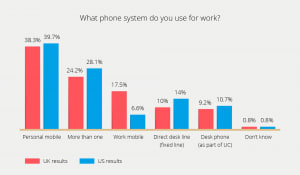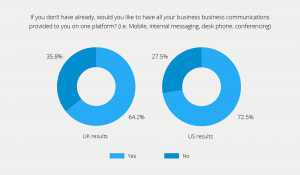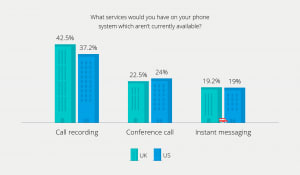

SMBs Call On Telcos To Help Them Level The Playing Field
We recently published the results of our survey of SMBs in the US, which showed what small businesses are missing from their current communications solutions. After uncovering some interesting results we conducted a comparison survey; this time of UK businesses.
Accounting for a large percentage of employees in the UK – 48% according to the report SMEs and Flexible Working Arrangements – SMBs differentiate themselves from larger enterprises through their agility and ability to respond to changes within their market quickly and easily. A cohesive communications strategy, one that encourages collaboration and productivity within the company as well as streamlining external conversations, gives smaller businesses the opportunity to triumph over larger companies that may struggle to adapt.
By consolidating their communications, across telephony, email, and instant messaging, small businesses are able to synchronise conversations that happen remotely and also out of office hours. With a similarly small number of SMBs in the UK currently using a unified communications (UC) solution – 9.2% in the UK compared to 10.7% in the US – the potential for telcos is clear.
Mobility is key across UK and US
Much like the findings of our US survey, personal mobile was also the most commonly chosen answer to the question ‘what phone system do you use for work?’ by participants of the UK survey, with 38.3% choosing this option compared to 39.7% of US respondents (see chart below). To keep workplace communications cohesive, a UC solution with mobility is essential for small businesses where workers use their personal mobiles so much. Small businesses may have limited office space, so having the confidence that their employees can have all the functionality of work available on their own devices is of great benefit. Getting employees to use their own devices may also be more cost effective for smaller businesses.
We looked at the different services that SMBs used as well as their phone system. In the UK instant messaging was the most popular choice, with 71.7% of respondents communicating in this way, closely followed by voicemail at 67.5%. This is unsurprising given the growth of Slack, which has grown to 5 million daily active users from 4 million since only October 2016. Instant messaging was slightly less common in the US with 57.9% using this service, while 79.3% of respondents said that they used voicemail. The benefits of consolidating all of these communications include an increase in productivity as conversations can be found in one place.
Interestingly, when asked if they would like to have all business communications, including mobile and deskphone as well as conference calling and internal messaging, provided in one UC platform 64.2% of UK respondents said yes, compared to 72.5% of US participants (see chart below). This is still a significant majority and one that should be pursued by telcos.
A flexible approach to work
Increasingly, employees have come to expect the flexibility to be able to work from a range of locations, at a time that is convenient to them. According to a Citrix-commissioned report by The Work Foundation at Lancaster University, over 50% of businesses in the UK are likely to have a flexible working policy in place by the end of 2017. This flexibility boosts the happiness of employees and can result in more efficient working with less time spent travelling if employees can work from home and remain connected with the rest of the team. In fact, research by Vodafone found that 83% of respondents to their extensive workplace survey said that adopting flexible working has resulted in improvements in productivity.
A unified communications as a service (UCaaS) model utilises cloud infrastructure in order to provide the kinds of features that were once only available to larger enterprises, and through a lower cost service that is quick and simple to deploy. Cloud-based solutions also offer a higher security level that can defend against cyber attacks. Any solution will need to serve a variety of devices to fully integrate all employees but will be better placed to adapt to updated technology in the future with intuitive software and the automatic rollout of new features.
Additional services
In a similar result to our US survey, the additional service that SMBs in the UK wanted most from their service provider was call recording. An even higher percentage than the US, 42.5% compared to 37.2% of US respondents, chose call recording as the service they would like to add to their phone system (see chart below). Call recording is becoming increasingly important to small businesses as regulation and compliance develop as issues for more industries.
Not only do UC solutions offer synchronised conversations, their enhanced reporting capabilities can be instrumental for business understanding and growth. Call recording can help with training new team members and the data captured can form the basis of reports that inspire improvements in business practices.
Another opportunity for business development is the integration of a UC solution with existing CRM systems. This can add value as customer details become a part of the communication process, creating an informed approach that can improve relationships and make conversations more efficient.
Not only would a UC solution create a simplified and cohesive approach to workplace communications and increase interconnectivity between employees of small businesses, the potential for increases in productivity and efficiency is great. When integrated with existing CRM systems and used to inform business practices, a UC solution can provide previously unrealised opportunities for growth and development.




